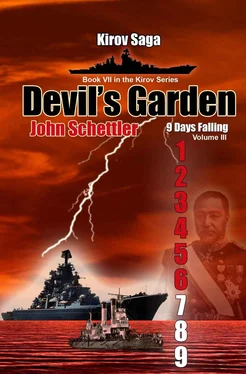John Schettler - Devil's Garden
Здесь есть возможность читать онлайн «John Schettler - Devil's Garden» весь текст электронной книги совершенно бесплатно (целиком полную версию без сокращений). В некоторых случаях можно слушать аудио, скачать через торрент в формате fb2 и присутствует краткое содержание. Жанр: Альтернативная история, на английском языке. Описание произведения, (предисловие) а так же отзывы посетителей доступны на портале библиотеки ЛибКат.
- Название:Devil's Garden
- Автор:
- Жанр:
- Год:неизвестен
- ISBN:нет данных
- Рейтинг книги:3 / 5. Голосов: 1
-
Избранное:Добавить в избранное
- Отзывы:
-
Ваша оценка:
- 60
- 1
- 2
- 3
- 4
- 5
Devil's Garden: краткое содержание, описание и аннотация
Предлагаем к чтению аннотацию, описание, краткое содержание или предисловие (зависит от того, что написал сам автор книги «Devil's Garden»). Если вы не нашли необходимую информацию о книге — напишите в комментариях, мы постараемся отыскать её.
Devil's Garden — читать онлайн бесплатно полную книгу (весь текст) целиком
Ниже представлен текст книги, разбитый по страницам. Система сохранения места последней прочитанной страницы, позволяет с удобством читать онлайн бесплатно книгу «Devil's Garden», без необходимости каждый раз заново искать на чём Вы остановились. Поставьте закладку, и сможете в любой момент перейти на страницу, на которой закончили чтение.
Интервал:
Закладка:
“But how, sir? What can we do?”
“First we secure the cooperation of our homeland. Then we teach the Japanese a lesson they will not soon forget.”
“The Japanese?”
“Don’t you know the history, Rodenko? Japan’s victory against us opened the door to Manchuria. They will push us out and move right in, and we won’t get back there again until 1945. The Japanese campaign in Manchuria led to the rapid development of their army, and they will built one of the finest navies in the world over the next few decades. This is what leads to their war of expansion in the Pacific, and it took the considerable power of the United States to crush them. I intend to stop them here, now, before they ever get the chance to expand their dreams of a far eastern empire.”
“But sir! We have only twenty-one missiles in the SSM inventory.”
“Correct, but we also have thirty-two S-400s left and a hundred missiles in the Klinok system. The Americans have adapted their RIM-67 Standard Missile 2 as a dual purpose weapon. It can now be used against ships as well as aircraft. They also did this for their RIM-174 ERAM missile, the SM-6. Time to get creative, Rodenko. We can do the same. The Klinok Gauntlet missile is effective for target heights as low as ten meters. Yes, it has only a 15 kilogram fragmentation warhead, but it could prove very useful against small craft or even coastal targets, and it will outrange most naval guns of this era as well. Don’t forget our deck guns either. We have 3000 rounds for the 152mm guns, correct Samsonov?”
“Yes sir. Plenty of ammunition for that system.”
“That and a thousand rounds for the 100mm bow gun.”
“But don’t they have battleships, sir? Look what it took to hurt the American ship just now. The Japanese were able to smash our entire fleet in 1905.”
“Yes, they call them battleships, but have a look here. Mister Fedorov left quite a few of his old naval books at the navigation station and I have taken the liberty of looking up some data. These are nothing like the ships we faced in WWII. The Japanese Admiral Togo’s flagship at the Battle of Tsushima was the Mikasa . Look for yourself, Mister Rodenko. The ship is half our size in both displacement and length. It has four 12 inch guns that can range out to 18,000 meters, and fourteen 6 inch secondary batteries. Those are irrelevant, because we will never let them get within gun range. Mikasa’s guns normally fired at no more than 15,000 meters or less. The ship can make only 18 knots. We can sail rings around anything the Japanese Navy has, and pound them with our deck guns from as far as 28,000 meters. They can’t catch us, or hit us with anything they have. True, our 152mm guns will not be as heavy as those of the enemy, but they will hurt these old ships, that I’ll guarantee. In special circumstances we can use a Moskit-II or MOS-III for a decisive moment to decide the issue. And don’t forget the Vodopad torpedo mounts. They range out 56,000 meters. How many torpedoes do we have, Mister Samsonov?”
“Sir, we have a standard load of ten Vodopad torpedoes and six more UGST torpedoes available for the KA-40 helo.”
“There,” Karpov smiled. “Put a single torpedo into the gut of one of these old ships and that will be all it takes. Why, we could sink all their battleships with our torpedoes alone!”
Karpov ran his finger down the pages of one of Fedorov’s books, and then turned, addressing the entire bridge crew. “Listen to this, gentlemen. Here is a passage from one of Fedorov’s books. It presents the Japanese view of the Russian Navy in the Russo-Japanese war.” He began to read, looking up from time to time to note the reaction of the men.
“The Russians are very brave-very brave. But not many are good, and they are savages. They can be very polite when it suits them, but Russian sailors are miserable people who lie on the snow, and have very little money, which they spend in buying cheap fish. They are dirty. That is all we know of Russian sailors, who are quite strange people to us. But we have no fear as to the result of a war with the Polar Bear.”
He gave the men a long, searching look. “Hear that, men?”
“He’s right about the money and fish, sir,” said Nikolin, and the whole bridge crew laughed.
“Yes, but we’ll see about raising your salary, Mister Nikolin, so you can afford a little caviar. In spite of what this man wrote of us, we are now the most powerful men on this earth. Mister Rodenko, we have sufficient conventional ordnance to smash the entire Japanese fleet, and that is what I intend to do should they challenge us at sea. But first-Vladivostok. We’ll announce ourselves and see what kind of reception we get. Then we will see about Port Arthur and the Japanese, and we will soon teach them that this Polar Bear has sharp new teeth!”
* * *
It’sname meant “Ruler of the East.” The city was a bustling frontier town at the very end of the world, as most Europeans might regard it. Its coat of arms, the famous Siberian Tiger, reflected its wild and sometimes fierce nature. Founded in 1860 as a military outpost by about 7,500 people, it had grown to a City of just over 90,000 by 1908. In many ways Russia’s defeat in the war of 1904-05 had led to its rapid development, along with the continuation of the Siberian Rail project. The loss of Port Arthur returned the city to preeminence by default, as Russia had no other suitable Pacific port.
Vladivostok was a wild mix of many cultures and ethnicities-European civility rooting itself in the central quarter, fringed by muddy streets, brothels, bars and gaming establishments, and bordered by the Oriental quarter, Millionka, which was home to numerous Chinese, Japanese and Korean immigrants. Crime was rampant there among the opium dens, and drug lords held sway in whole neighborhoods where at times they would amuse themselves in a game that sought to discover how long a man could remain alive while hanging from a rope by his neck. The First River Penal center north of the city center was never lacking for new arrivals.
Even in the main European district along Svetlanskaya Street by the harbor quays the atmosphere was that of a devil may care frontier town, where entertainment offered by a troupe of dancing gypsies often began at midnight in the favorite Pacific Ocean Theater, and carried on into the early morning hours. Here was found the Imperial Bank, Lutheran Church, Museum, Oriental Institute, Post Office and the Upenski Cathedral, yet these staid institutions could not impose but the barest patina of civility on the place. It was still a den of thieves, gamblers, adventurers, frontiersmen, and indigent sailors, with enough cafes, restaurants, cinemas and gaming houses to keep them all well occupied. It was an outpost of debauchery at the end of two thousand miles of iron rails that scratched their way through the wilderness of Siberia. It was at once the terminal end of that long overland passage, as well as the place of new beginnings that was at the heart of every frontier.
A new beginning meant opportunity, and that prospect was not lost on wealthy entrepreneurs, which came to the city by sea in search of profit and fortune. A great department store stood near the main railway station, Kunst amp; Albers, burgeoning with wares from every quarter. Here also were the famous Versailles Hotel and the Golden Horn, offering a taste of real European luxury to passengers debarking from steamers. Military barracks surrounded the docks, a steady source human firewood for the fires of gambling, prostitution and crime in the city. Yet all this existed side by side with elegant performances at the Pushkin Theater, museum lectures, Sunday tea parties, opera at the German Singing Club, and Victorian ladies meeting in sewing circles.
Читать дальшеИнтервал:
Закладка:
Похожие книги на «Devil's Garden»
Представляем Вашему вниманию похожие книги на «Devil's Garden» списком для выбора. Мы отобрали схожую по названию и смыслу литературу в надежде предоставить читателям больше вариантов отыскать новые, интересные, ещё непрочитанные произведения.
Обсуждение, отзывы о книге «Devil's Garden» и просто собственные мнения читателей. Оставьте ваши комментарии, напишите, что Вы думаете о произведении, его смысле или главных героях. Укажите что конкретно понравилось, а что нет, и почему Вы так считаете.












